Protein is a vital macronutrient, playing a crucial role in muscle growth, recovery, and overall wellness. It’s one of the building blocks of our bodies, supporting everything from muscle repair to hormone production, and even helping to keep us feeling full and satisfied after meals. Yet, when it comes to figuring out how much protein we actually need, many people find themselves overwhelmed by conflicting information. At Body Factory Bali, we understand the importance of nutrition in reaching your wellness goals, so here’s a straightforward guide to understanding your protein needs, the best sources, and how to incorporate it into your diet effectively.
Why protein is important
- Muscle growth and repair
- Protein is essential for building and repairing muscle tissue, especially after exercise. When we work out, we create tiny tears in our muscles that require protein for repair, making muscles stronger and more resilient. Without adequate protein intake, muscle growth and recovery are compromised, which can impact performance and lead to fatigue or injury.
- Recovery and reduced soreness
- After any kind of workout—especially resistance or high-intensity training—protein helps accelerate recovery. It aids in repairing muscles and can help reduce post-workout soreness, ensuring you're ready to tackle your next session sooner.
- Satiety and weight management
- Protein has the highest satiety level among macronutrients, meaning it keeps you feeling full longer than carbohydrates or fats. This can help with managing weight by reducing hunger and controlling appetite, making protein-rich foods excellent for those looking to maintain a balanced, healthy diet.
How much protein do you really need?
Your protein needs depend on factors like age, activity level, and fitness goals. Generally speaking:
Sedentary adults: About 0.8 grams of protein per kilogram of body weight.
Active adults: 1.2 to 1.6 grams per kilogram is a good target for people who are physically active.
Athletes or strength trainers: Those engaged in intense or regular strength training may benefit from 1.6 to 2.2 grams per kilogram to support muscle growth and recovery.
For example, an active adult weighing 70 kg would need around 84–112 grams of protein daily, while someone training intensely might aim for 112–154 grams. It’s best to spread protein intake throughout the day for optimal absorption, so consider incorporating protein at each meal and snack.
Optimal protein sources
A balanced diet should include a variety of protein sources, offering essential amino acids and other nutrients that contribute to overall health. Here are some high-quality options:
Lean meats (Chicken, Turkey, Lean Beef)
Lean meats are excellent sources of complete proteins, containing all essential amino acids. Grilled chicken breast, for instance, packs around 26 grams of protein per 100 grams.
Fish and seafood (Salmon, Tuna, Shrimp)
Rich in omega-3 fatty acids, fish and seafood provide high-quality protein and healthy fats. Salmon offers about 20 grams of protein per 100 grams and promotes heart health.
Eggs
A versatile and affordable source, eggs provide about 6 grams of protein each and are nutrient-dense, containing essential vitamins and minerals for muscle recovery.
Dairy products (Greek Yogurt, Cottage Cheese, Milk)
Dairy products are great for those looking for a quick and easy source of protein. Greek yogurt, for example, contains around 10 grams of protein per 100 grams, along with probiotics for gut health.
Plant-based options (Lentils, Chickpeas, Tofu, Quinoa)
For those who prefer plant-based sources, foods like lentils (18 grams of protein per cup), tofu (8 grams per 100 grams), and quinoa (8 grams per cup) provide substantial protein. Pairing different plant proteins can help you achieve a complete amino acid profile.
Protein powders and supplements
For those with busy schedules or specific protein goals, protein powders (like whey, casein, or plant-based options) are convenient. They’re ideal post-workout for quick muscle recovery, but whole food sources should still be the foundation of your diet.
Tips for optimal protein intake
Spread protein throughout the day
Instead of consuming all your protein in one meal, aim to include it in each meal and snack. This steady supply supports continuous muscle repair and reduces hunger.
Post-workout protein
After a workout, aim for 20–30 grams of protein within 30–60 minutes. This timing helps maximize recovery and muscle repair.
Incorporate protein-rich snacks
Hard-boiled eggs, Greek yogurt, or a handful of nuts are great protein-rich snacks that keep energy levels up between meals.
Balance with healthy fats and carbs
Protein works best when paired with a balanced intake of healthy fats and carbohydrates, especially if you’re physically active. Carbs fuel workouts, while healthy fats support long-lasting energy.
Monitor your portions
Protein portions can add up quickly, so measuring is helpful to ensure you're meeting but not exceeding your goals. A palm-sized portion of meat or fish (about 3–4 ounces) provides around 20–25 grams of protein.
Conclusion: fueling your body with protein at Body Factory Bali
At Body Factory Bali, we believe nutrition is as important as exercise in achieving your wellness goals. Protein plays a key role in muscle growth, recovery, and satiety, helping you feel strong, energized, and ready to conquer your next workout. Whether you’re focusing on building strength, staying lean, or simply eating for long-term health, the right protein intake and quality sources make all the difference.
And when you’re ready to refuel, our Dispensary offers high-protein meals perfect for your post-training needs, as well as a range of delicious protein shakes to enjoy. Body Factory Bali has everything you need to support your protein goals and optimize your fitness journey—from the workout floor to our healthy kitchen. So, come fuel up and feel your best every day!

